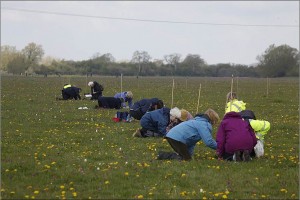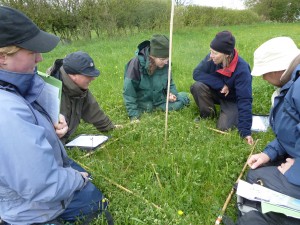An award-winning, externally-facing partnership with research at the core
I don't think of myself as an academic. Before I took on my current role as an Outreach Coordinator within the award-winning Floodplain Meadows research team at the Open University I'd worked for 12 years for the Environment Agency, delivering policy, legislation and proactive conservation projects ‘on the ground’ in Dorset, Wiltshire and a little bit of Hampshire. I'd worked with a wide range of conservation and community partners, occasionally getting cross with flood defence engineers. In short, I came to this job for a change!
My background, therefore, is all about ‘wanting to make a difference on the ground’, sometimes in the absence of evidence and research (for better or for worse). Policy is generally informed by research, but sometimes practical decisions are made in the absence of sufficient evidence. For the ‘person on the street’ or the ‘staff on the ground’ time is a real pressure and if you don’t hark from an academic background, reading journals is not a priority. Instead, you look to your national teams for support and guidance.
So when I saw this job to co-ordinate outreach within a team of ecosystems researchers I thought what a useful thing that would be; connecting researchers with people involved in making routine site management decisions that affect floodplain meadows.
The Floodplain Meadows Partnership
The Floodplain Meadows Partnership does just that. Even before the Partnership started in 2007, the team had many contacts across the UK, and were involved in practical research trials helping to shape policy and management on floodplain meadows with national conservation organisations.
The Partnership consists of seven national conservation organisations involved in floodplain meadows. The high-profile nature of these partners means that collectively we are taken more seriously than we would be individually. The partners are:
- The Open University (project hosts)
- Natural England
- Environment Agency
- The Wildlife Trusts
- Centre for Ecology and Hydrology
- Field Studies Council
- The RSPB
Developing and sustaining an engaged research collaboration
Ultimately, our work is about making and maintaining effective connections between the various stakeholders affected by the research. This requires effective and ongoing communication and engagement.
For example, members of the project team have proactively contacted floodplain meadow managers in the UK by phone, arranged site visits to more than 60 different meadows, organised conferences, training workshops, attended guided walks and open days (ferret racing at Mottey Meadows Hay Festival was a high point!), and designed the Floodplain Meadows website from scratch.
We have given umpteen presentations, generated publicity and also importantly continued to run an annual survey programme and a series of research management trials across England. This is no mean feat and takes a lot of time and resource.
The outcome is that many people in the conservation sector who are involved in some way in the management, policy direction or just the pure pleasure of floodplain meadows now know the Partnership as the place to come for advice. We are even working with 10 community groups in some capacity, and our conference in 2014 has a session just for them!
Much of the above list is largely dissemination or making contact with people. It is resource intensive, but is relatively easy. The real issue is in understanding where these contacts and discussions, these articles in newsletters, this management trial, this training workshop, this website etc., actually lead to a change in practitioner behaviour, policy and ultimately change in management.
We know from all this experience that long term relationship building is really important. We are more likely to engage if we are reliable, available, trusted and knowledgeable. Where we are seeing changes in management on the ground, it is usually through several years of working with local staff in a mutually beneficial way.
We are also engaged in a volunteer project, collecting genuinely new data on three sites across the UK. We have 255 volunteers counting snakeshead fritillaries and surveying bumblebees, supported by academics and brilliant site managers! We would never be able to collect this volume of data without volunteers. This is proving very interesting and should generate publications. It also has a very high public interest factor.
However, our project would mean little in the non-academic world if we could not pick up on concerns expressed by site managers and provide answers. We have been able to establish research (PhD students and short term contract projects) in response to questions from site managers. Therefore the project tries to maintain as current a profile as we can, using stakeholder issues as an important strand in determining research direction.
From my perspective, I am content to say that the discussions and relationships are genuinely two way; that the project team learn from local staff as much as the other way round and that the research does see the light of day in a genuinely changing manner. Personally I would not be satisfied with a project that I didn’t think had a worthwhile and beneficial impact in the natural world!
If you're interested in learning more about our work the following video, presented by David Gowing, provides an overview of the work we're engaged in.



